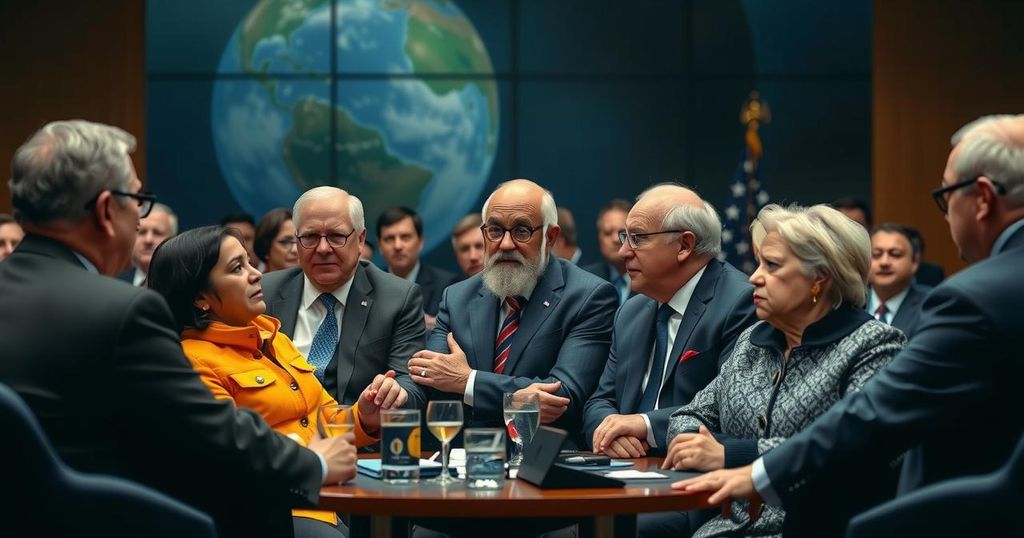In Brazil, G20 leaders convene to address climate change and global conflicts, particularly in Ukraine and the Middle East. President Biden attends his last summit amid increasing influence from China’s President Xi Jinping. Brazilian President Lula promotes poverty alleviation and climate initiatives while seeking to increase taxes on billionaires. The summit occurs under tight security following a recent attack, and involves ongoing negotiations about a communique highlighting diverse member interests in climate finance and international stability.
Leaders from the G20 commence their summit in Brazil, aiming to reignite stalled climate negotiations while addressing disputes related to the ongoing conflicts in the Middle East and Ukraine, particularly in the context of Donald Trump’s potential reascension to the White House. President Joe Biden will attend this summit, marking his last such engagement as president, with the backdrop of heightened prominence by Chinese President Xi Jinping. Brazil’s left-leaning President Luiz Inacio Lula da Silva utilizes his role as host to champion critical issues, such as hunger alleviation and climate change, as well as advocating for increased taxation on the ultra-wealthy. The contentious discussions surrounding wars that have deeply fragmented G20 member countries will also significantly feature in this event. A source from the Brazilian foreign ministry stated that while some nations seek alterations to a draft summit communique, Brazil believes the text should remain finalized. Furthermore, Biden’s recent policy change allowing Ukraine access to long-range US missiles poses a pivotal moment that may influence European allies’ strategies. In addition, the G20 leaders face immense pressure to revive the UN climate talks in Azerbaijan, which are currently stalled on climate finance for developing nations. UN Secretary-General Antonio Guterres has urged G20 nations, responsible for 80% of global emissions, to exhibit “leadership” in reaching a consensus. Security measures are stringent at the summit, especially following a recent attempted bombing targeting Brazil’s Supreme Court, attributed to a suspected extremist. Biden’s attendance caps his farewell tour, which included a series of diplomatic engagements in the Amazon region, emphasizing his climate agenda despite fears of a Trump presidency looming ahead. The G20 meeting occurs in a year plagued by severe weather events and heightened discussions around climate action, as countries grapple with the realities of climate change impacts. At the last G20 gathering in India, participants advocated for a tripling of renewable energy sources by 2030 but fell short of committing to phasing out fossil fuels. Notably absent from this summit is Russian President Vladimir Putin, who faces an arrest warrant issued by the International Criminal Court due to the Ukraine conflict. Lula publicly expressed his desire for the discussions to address global poverty rather than solely fixate on warfare, stating that too much focus on conflict may sideline crucial conversations concerning the needs of impoverished populations worldwide. The summit also features Lula’s introduction of a “Global Alliance against Hunger and Poverty” initiative, with Brazil pushing for higher taxation on billionaires. However, opposition exists from other G20 members, notably Argentina, demanding reservations on parts of Lula’s agenda. Regardless, the Brazilian foreign ministry remains optimistic about achieving a consensus despite these challenges.
The G20 summit serves as a platform for the world’s major economies to convene and address pressing global issues, such as climate change and international conflicts. The summit in Brazil carries particular weight as it marks President Biden’s final participation while in office and sets the stage for critical discussions about leadership in climate action and financial support for developing countries. Furthermore, ongoing geopolitical tensions, particularly concerning the Ukraine war and the Middle East conflicts, present significant challenges to coalition-building among member states. Lula’s leadership focuses on pressing social issues, reflecting a shift towards addressing poverty and inequality on a global scale in harmony with climate initiatives.
The G20 summit in Brazil stands as a crucial opportunity for world leaders to confront significant challenges surrounding climate change and ongoing conflicts. The discussions are underscored by concerns over poverty and calls for equitable financial contributions from wealthier nations to support developing countries. With President Biden’s potential legacy at stake and geopolitical dynamics swirling, the summit’s outcomes could have lasting implications for global collaboration in these pressing matters.
Original Source: www.fox28spokane.com







